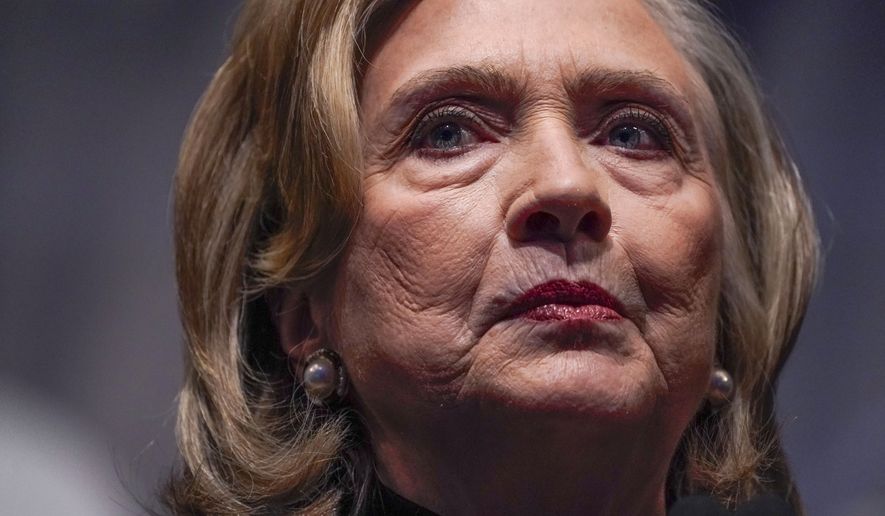The Federal Election Commission has fined Hillary Clinton’s 2016 presidential campaign and the Democratic National Committee for failing to disclose campaign spending that ended up in the pocket of Christopher Steele, the former British spy who authored a Russian-based dossier to damage Donald Trump.
The FEC fined Mrs. Clinton’s campaign $8,000 and levied a heftier punishment on the DNC, which must pay a $105,000 penalty.
The agency said the two entities “misreported the purpose of certain disbursements.”
The commission issued the fines after receiving a complaint from the Coolidge Reagan Foundation, which describes itself as a First Amendment watchdog group.
Neither the DNC nor Mrs. Clinton immediately commented about the FEC ruling.
Mr. Trump proclaimed the FEC fines provided further proof that the Clinton campaign and other Democrats were out to damage him politically through the now-discredited Steele dossier.
“This was done to create, as I have stated many times, and is now confirmed, a hoax funded by the DNC and the Clinton Campaign,” Mr. Trump said in a statement. “This corruption is only beginning to be revealed, is un-American, and must never be allowed to happen again. Where do I go to get my reputation back?”
The FEC announced its decision a week after Mr. Trump filed a sweeping lawsuit against Mrs. Clinton, the DNC and others. The lawsuit said they “maliciously conspired to weave a false narrative” that Mr. Trump was colluding with Russia to win the 2016 election. It cites the Steele dossier and lays out how Mrs. Clinton and other Democrats conspired to assemble it as a show of proof of collusion.
“This duplicitous arrangement existed for a singular self-serving purpose — to discredit Donald J. Trump and his campaign,” the lawsuit said.
A spokeswoman for Mr. Trump has not responded to a request for a comment about the FEC fines.
The group that filed the FEC complaint accused the Clinton campaign and the DNC of conspiring with foreigners in violation of federal campaign finance law to undermine Mr. Trump, who was then the Republican presidential nominee.
According to the complaint, the Clinton campaign and the DNC used the law firm Perkins Coie to “scheme” with Mr. Steele, a British national, to write and disseminate the salacious and unverified Steele dossier, which was produced using information from current and former Russian government officials.
The dossier sought to tarnish Mr. Trump with such infamous stories as the existence of a “pee tape” that showed Mr. Trump urinating on a mattress in a Moscow hotel room with prostitutes. None of the content of the dossier was ever proved, but it dominated media coverage of Mr. Trump well into his presidency.
In 2017, it was disclosed that the Clinton campaign and DNC attorney Marc Elias paid the Washington research firm Fusion GPS to dig up dirt on Mr. Trump and Fusion GPS hired Mr. Steele.
“In the process, the Clinton machine failed to publicly report the use of Perkins Coie as a ‘straw man intermediary,’ despite funneling more than $1 million through the firm — a blatant violation of federal campaign finance laws,” Coolidge Reagan Foundation officials said in a statement. “The fact that Hillary for America and the DNC procured something ‘of value’ from a foreign national — provided by the Kremlin — while failing to publicly acknowledge their relationship with Perkins Coie, amounts to false reporting in unprecedented fashion,” said the statement.
The Steele dossier also played a key role in instigating the FBI to investigate Mr. Trump on accusations that he colluded with Russia to win the 2016 election. The bureau relied on it for a yearlong wiretap of a Trump associate. Then-FBI Director James B. Comey reported the dossier contents to Mr. Trump early in his presidency.
Details of that meeting between Mr. Comey and the president were leaked to reporters and justified news media’s decision to begin reporting on the Steele dossier’s wild and unproven claims.
Democratic lawmakers also endorsed the Steele dossier. They included Rep. Adam B. Schiff of California, who was the ranking member of the House Permanent Select Committee on Intelligence at the time.
Mr. Schiff has not retracted his comments, even though the dossier contents were never proved, nor was there any direct evidence that Mr. Trump colluded with Russia.
Nonetheless, Mr. Schiff said the dossier’s claim that Russia helped Mr. Trump’s campaign “turned out to be all too true.”
The dossier’s contents were debunked in special counsel Robert Mueller’s 448-page investigative report issued in 2019.
The Steele dossier included at least a dozen accusations of collusion between Mr. Trump and his associates, and Russia. The Clinton campaign provided the dossier to news outlets and the Justice Department.
Mr. Mueller’s investigation of Trump-Russia collusion, which lasted nearly two years and cost taxpayers $32 million, could not confirm a single claim from the Steele dossier.
• Susan Ferrechio can be reached at sferrechio@washingtontimes.com.




Please read our comment policy before commenting.